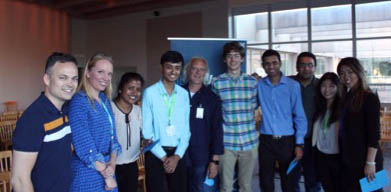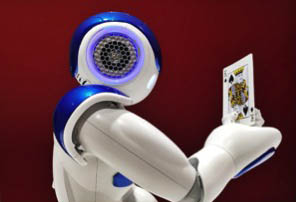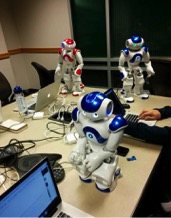UT Dallas CS Student and IBM Watson Intern Shares the Details of His Summer Internship and His Team’s Award Winning Robot Poker Players AI Project

This summer, Indervir Banipal, a UT Dallas CS student, was invited by IBM Watson to take part in a summer internship at their Research Triangle Park Campus in Durham, North Carolina. Indervir, along with five other students from across the nation were asked to make two NAO robots learn to play poker through the IBM Watson. We asked Indervir to write a blog entry about his internship, the project, and how he and his teammates secured future full time positions with IBM Watson by having their project win at the Annual Intern Showcase.
This summer, IBM Watson invited six of us as interns to their Research Triangle Park campus (Durham, North Carolina) to build a project where we can evangelize Watson in order to attract developers, researchers, academicians and make them understand it’s capabilities. To do this, we came up with a cool idea, which was to make two humanoid robots play poker. This goal took us through an exciting three months’ journey where we implemented the Watson services and got a chance to understand benefits and challenges of using them in our challenging business scenario: Make Robots play Poker! Previously, Watson had made a Hotel Concierge for Hilton hotels.
IBM Watson has an Annual Intern Showcase where all the interns across the nation get together and compete. This time it was hosted at Watson Austin Labs in Austin TX with 200+ interns competing for the finals. During the first round of the competition, everyone presented their projects before an audience of interns who would be voting on which projects they thought to be the best. The top four teams with the highest number of votes were called onto the stage in the finals to present before the CTO & Executives of IBM Watson. Our team was voted into the top 4. We then presented our project once again where we made our robots play a round of poker on stage. It was a fierce competition: one of the teams from Dartmouth presented their project where they used Watson Health to save the life of a cancer patient; another team from MIT and NC State built a conference commander using Watson. Vishal Karande, a PhD intern from UT Dallas, presented his project titled, “Making Sense of Multimedia Data,” in a group of three.
The CTO & Execs of Watson declared our project as the winner, and we were presented with the full-time employment offers on stage before our fellow IBM Watson interns.

The purpose of our project was not to make the best poker playing Artificial Intelligence (AI) in the world, but rather to demonstrate how the developer community can build intelligent solutions using Watson and Bluemix. Leveraging the uniqueness of our problem statement proved to be the best way to do this. We started with a group of six interns from different universities. The following is a list of each team member with our respective roles and responsibilities within the group:
- Isabel Ren, University of Pennsylvania: Poker cards training, Robots’ gestures
- Vinitha Yasiki, University of Utah: Reconciliation service, Dialog, Natural Language Classifier
- Josh Rees-Jones, North Carolina State University: Visual Recognition, Speech-Text, Text-Speech
- Dhaval Sonawane, North Carolina State University: Orchestration service, IoT platform
- Ryan Brink, Iowa State University: Watson Training Assistant, Improving Accuracy
- Indervir Banipal, The University of Texas at Dallas: Poker service, Game State, Robots’ personality

On the first day of our internship, we were handed two NAO Robots and within a span of two months, we were given the target of making them play poker using Watson and Bluemix. To provide cognitive abilities to the robots we used the following Watson services; Visual Recognition, Speech to Text, Bluemix, Text to Speech, Dialog, and Natural Language Classifier.

Watson services alone were not sufficient to meet our business goals here as we had to make our robots play poker. Therefore, we needed a poker service that I personally developed from scratch and integrate with the solution. By combining Watson services and our custom developed services, we developed a robust and a highly fault tolerant solution which almost replicated the human brain: it had all the senses like see, listen, understand, converse, speak and of course, play poker!
Throughout the internship, we regularly blogged about our on-going work through IBM Watson’s official channels like Twitter, LinkedIn, so that developers could refer to our work for building their own intelligent solutions. The details about the design and the architecture of the project are available in one of the blogs, which I wrote for IBM.
I had observed that personality is a very important component in making AI play against humans in aggressive games like poker, chess etc. I then submitted a patent and successfully defended it before the Cognitive & Human Languages Board (NLP) of IBM. IBM highly encourages new ideas that can be patented; IBM is awarded the highest number of patents (7000+ annually) than any other organization in the world.
Watson is an emerging technology and it was very exciting to be in the group of early adopters. We were mentored by experts who are implementing Watson in different segments of industry like health, finance, robotics etc. Apart from performing the technical tasks, we identified the business challenges Watson is facing and we tried our best to overcome them by providing recommendations to the relevant teams at Watson. In a short span of three months, our project turned out to be an ideal example to demonstrate how we can use Watson, Bluemix and IoT to build intelligent solutions. We also took our robots to American Underground, which is a breeding ground of startups, most of which are funded by Y Combinator.

Since I joined UT Dallas, I have been very interested in data sciences, which has lead me to take courses in Big Data and Machine Learning. These courses helped me get an internship at IBM Watson. I am currently working toward my thesis under the guidance of Dr. Latifur Khan at the Data Management & Data Mining Lab. This entire experience has helped me understand how to build a novel approach to solve an open problem, as well as helping me file my first patent at IBM.
I personally, would highly recommend anyone who is interested in AI and ML, to work on Watson services, Bluemix cloud and IoT platform provided by IBM. Watson Developer Cloud is a great to place to start getting hands-on. Other leading organizations that are trying to make significant progress in this direction are Google, DeepMind, Facebook AI Research (FAIR).
I will conclude with this quote, which I heard recently:
‘I don’t worry about AI passing the Turing’s test, but I am worried about AI intentionally failing it’




